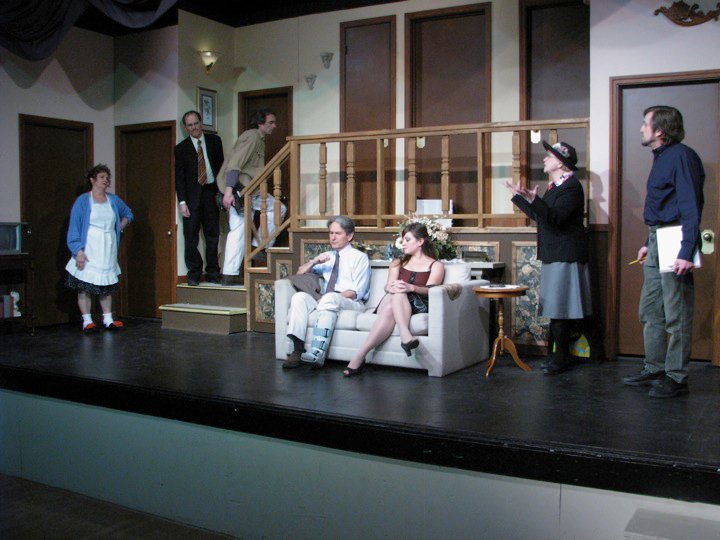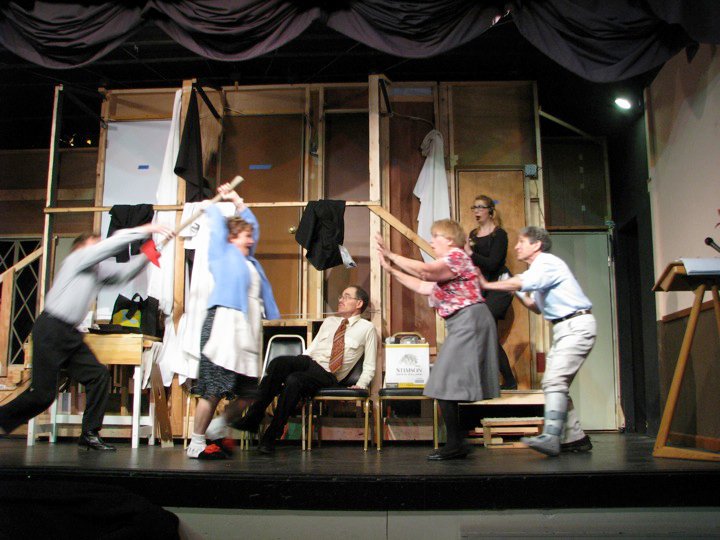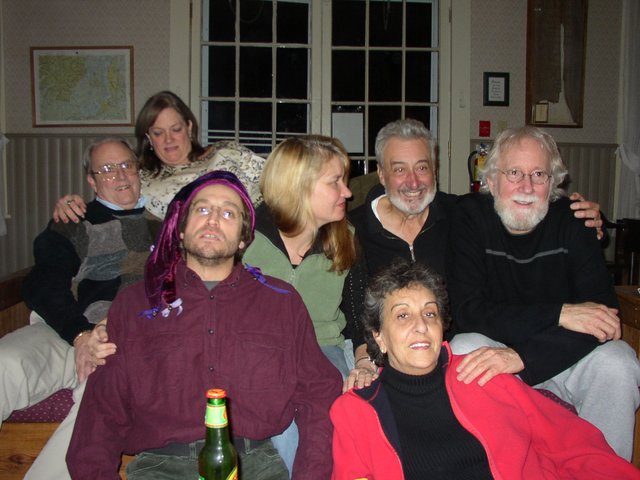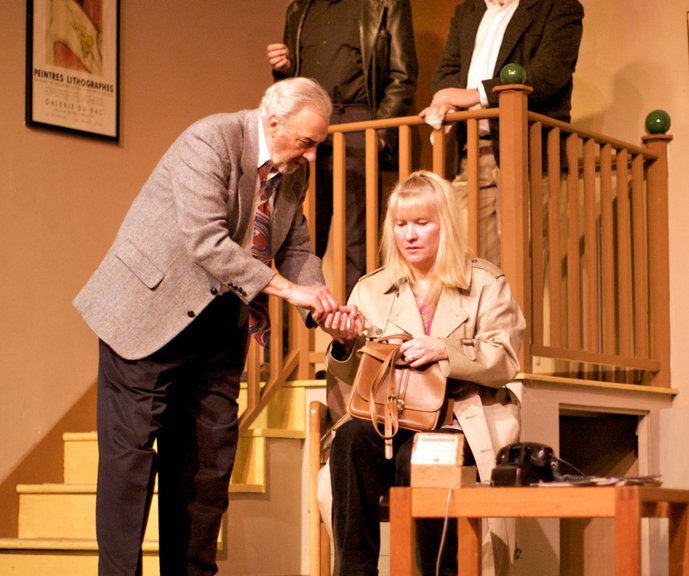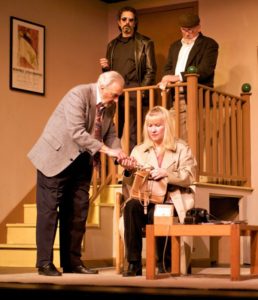You’d think that, by the time I reached 72 years old, my life would be predictable and in order. Not so. Just when I think everything is going well the whole picture explodes throwing burning pieces all over the place. Last week was one of those times when my life exploded. Over the last week I got most of the small fires stamped out but there are still a lot left that aren’t in my purview to put out that can flare up again. This is just the most recent in a long string of problems that goes back 20 years or more. Here is where I insert a long string of expletives but that would make our wonderful moderators unhappy so I’ll pass.
I regret that I lost the momentum that I had with my writing. I was really proud of the posts on this journal. I was very prolific (for me) and now I have to get back into the writing zone again.
Today I am finally going to get to the play that started this Journal: “Love Song” but first …
This really does pertain to “Love Song”. It’s about blocking. Blocking refers to how the actors move around the stage.
When I tell the story of the play, I have a number of arrows in my quiver: First is the script. We’ll set that aside for now. Next is the set itself: Is it realistic or suggested? Look at the photo’s I’ve included on these posts, most of the sets are very realistic. They look like the house or the room where the action takes place. I will attach a couple of photos from the play “Noises Off” where you can see the front of the set (with 7 of the 8 doors needed) and a photo of what the set looks like from the back. (In “Noises Off” the set is actually turned front to back so the audience can see what is happening back stage during the second act of play.)
Other plays like the Arthur series and Torso have minimal sets – often just a pieces of fabric hung from the ceiling. The set is very important in telling the audience of the time and place of the play.
Lighting is very important in telling the story of the play. Think of “Wait Until Dark” where the absence of light tells us about what it feels like to be blind. In general, the lighter the story, the brighter the lights: A comedy will be brightly lit and a drama will be much dimmer with lots of shadows. If you’ve ever seen a play, you will have seen dozens to hundreds of lights, and each one can be individually controlled. By using filters we can set the tone of the scene: Rose colored filters make the scene warm and loving. Blue makes the scene look cold and confrontational. Amber will make the set look old and candle lit. It all goes into putting the audience into the mood the director wants in that portion of the play.
The next arrow is sound. In this case, I’m not talking about music to accompany singers but sounds that are part of the plot: Thunder, cars starting and driving away. Not too many years ago, sound was generated live: A piece of metal would be shaken to generate the sound of thunder, doors would be slammed off stage to simulate actions that did not take place on stage. Fifty or sixty years ago, with the advent of easily recorded sound effects, the use of sound on stage took a small leap forward: We started to use recorded ambiance during the play: The sound of crickets outdoors at night; the sound of diners in a restaurant; the sound of a car starting and driving away. In the meantime, movies were using music throughout the movie to set the mood.. Think of the theme from “Jaws” to see what sound can accomplish or the soundtrack of “Jurassic Park”.
Over the past few years I have started to use sound inside my plays to set the mood. We used a penny whistle and drum in the first Arthur play, a flute in the second. “Torso” used sound throughout the play to set the mood of the scene. Purists don’t like sound/music in a play. It can easily be overdone but used properly, I think it helps a lot.
Costumes help more than you might imagine. It will tell the audience a lot about the character: Is she wealthy? Is she organized? Does she have taste? What is her age? What is the period and location of the play? The French Revolution? The wild west? Medieval Britain? and so on.
There are several other arrows available to the Director: Makeup, furniture, paint colors and so on.
What I want to talk about is blocking. Next to the words of the script and the delivery of the words by a actor, blocking is the most important element to telling the story. A well blocked play will tell the story without any words. How do I explain it? I need to back up and brag a little.
Each year Lincoln Center Theater in New York, invites 60 or so directors from all over the world to a “laboratory” to investigate issues facing the theater. In 2007, I got a copy of the invitation to apply. They were looking for directors early in their directing career. At that point, I was early in my directing career even though i was retired and 65 years old. I applied and was accepted. (When I got there I was at least twice as old as any of the other directors. They have since changed the application to ask for “young directors early in their careers” >:(
Anyway, the Lab was life changing for me. It validated what I did and what I thought about in the theater. I remember one discussion the group had with the famous British Director, Richard Eyre. He was describing his career. He said that early on, he would build a model of the set and move little paper actors around on the set to figure out what to do. I did that too!!
Then he reached the point where he could pretty much see the set in his mind and envision how the actors moved around on it. I did that too!!!
Finally, he reached to point where he let his actors find their blocking. He said to his actors: “Show me what you got” then he would adjust what he saw from the actors until he got the picture he wanted. That’s what I do!!!
To this day, I always let the actors find their way through the scene first then make adjustments. I repeat: A well blocked play will tell the story without any words. Do the actors move closer to each other? Further apart? Do they look at each other? Each sentence in a well written play will have an obvious movement associated with it. The one thing I want to avoid is “talking heads”: Two people sitting or standing and delivering their lines without any movement.
Another (short) digression: The first task we undertake when rehearsing a play is the rough blocking. The actors are in the process of memorizing their lines and the real work can’t begin until the memorizing is done. During this period we work on the rough blocking of the play. The amount of blocking accomplished varies greatly: Sometime we will spend six hours on one minute of the play, sometimes we can do 15 minutes of play time in three hours. Another problem is that we work out the blocking then may not revisit it for a week or more. To keep track of the blocking we use our Stage Manager to record what is going on. During these rehearsals our Stage Manager writes all of the movement of the actors in the script. A good SM will have developed a shorthand to record all the movement on stage. I have the luxury of working with an extremely talented Stage Manager who can record every nuance of what is happening on the stage. Always writing in pencil so it can be easily erased. I’m a director, that means I can change my mind. 😉
Notice that I call it the “rough blocking”. With experienced actors, as they find their characters, they will start to find things that work for them that was not the way we originally blocked it. (Remember our discussion of the hard working actors? They will experiment with many things, including blocking, throughout the rehearsal period.) I always get my Stage manager BIG erasers!!
There are literally thousands of ways a play can be blocked. There are hundreds of ways to communicate the story to the audience. There are a few ways that are really good but there is only one way that screams “this is the right blocking” to me. Sometimes I can see what we need to do. Sometimes we have to look for it. Sometimes, it may not appear for weeks. Sometimes even after the show opens. Sometimes I’ll find it, sometimes the actors will find it. But when it is right, everyone can see it. it’s like a great light bulb turns on.
I’m almost out of time for today but I will tie this to “Love Song”. At our last rehearsal a husband and wife are discussing her brother – something she doesn’t want to hear right now. I had her walk away from her husband. The direction I sent her in took her between the chair he was sitting in and a coffee table. Instead of walking away from him, she got closer to him and knelt beside his chair to press her wishes. Very different that I had envisioned but far more powerful. It was the perfect action – not to say there isn’t an even more perfect action – but that one moment made the rehearsal for me. I was a happy camper!!!
More next time.
Doug B
